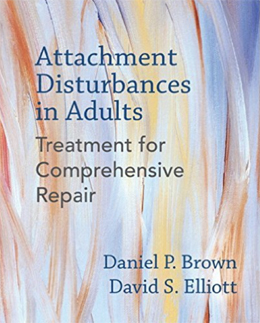
Treating Insecure Attachment in Adults
Treating Insecure Attachment in Adults: The Three Pillars of Comprehensive Attachment Repair
met David S. Elliott Ph.D.
24 en 25 oktober 2019. --------- Volzet maar u kan zich nog inschrijven op de wachtlijst
Since John Bowlby’s and Mary Ainsworth’s pioneering work on the development and nature of attachment in children, there has been great interest in how early attachment problems affect adult relationships and well-being. Though there is now very good understanding of the origins and identification of attachment disturbances in adults, clinicians are often dismayed by the difficulties of helping clients move from attachment insecurity to security. Some treatments can be effective, but typically take a very long time and often do not produce comprehensive or stable change.
Recent evidence indicates that understanding and treating attachment insecurity can be a very helpful component of trauma treatment. When someone coming to mental health treatment for trauma has insecure attachment, resolution of the attachment security before treating the trauma makes the subsequent trauma treatment much more effective and efficient.
This workshop will include:
- - a foundation in attachment theory, the development of the attachment bond, assessment, and current treatments.
- - the theoretical foundations and detailed practical description of a state-of-the-art, highly effective and efficient method for treating adults with attachment disturbances.
Emphasis will be on practical applications for clinicians, and will include demonstration sessions and opportunities for participants to practice and receive feedback about their experiences of these methods.
 The workshop is based on the recently published text, Attachment Disturbances in Adults: Treatment for Comprehensive Repair (Brown & Elliott, 2016)
The workshop is based on the recently published text, Attachment Disturbances in Adults: Treatment for Comprehensive Repair (Brown & Elliott, 2016)
“This is an extraordinary achievement – the must-have book on attachment – encyclopedic – everything you needed and wanted to know about attachment, and then some – history, research, typology, AND treatment!”
Diana Fosha“A masterpiece of integration, creativity, and clinical wisdom...a vibrantly innovative treasure that will endure, one of those rare trail-blazers."
Kathy Steele
Learning Objectives
Participants will:
- Understand the maturational and caregiving conditions that contribute to secure, dismissing, anxious-preoccupied, and disorganized attachment.
- Understand how the conditions that create secure attachment in children can be a basis for effective and efficient treatment of adult insecure attachment.
- Understand the strengths and limitations of current treatments.
- Be able to describe the Three Pillars of treatment of attachment disturbances.
- Have direct experience of using the Ideal Parent Figure method for creating new, positive representations of secure attachment.
- Recognize the common challenges and positive signs of effective use of the Ideal Parent Figure method.
- Feel confident about applying the Ideal Parent Figure method in clinical practice.
- Understand why metacognition and collaboration are poorly developed when attachment is insecure.
- Become familiar with methods for helping clients develop metacognitive skills and collaborative relational behavior.
- Feel confident about bringing metacognitive and collaborative methods into clinical practice.
- Understand the interdependence of the Three Pillars and their treatment methods.
About the Presenter
 David S. Elliott received his Ph.D. in Psychology from Harvard University in 1989. He is a former President of the Rhode Island Psychological Association (USA), and is on the faculty of the International School for Psychotherapy, Counseling, and Group Leadership, in St. Petersburg, Russia. As a clinical psychologist, he has a psychotherapy practice in Providence, Rhode Island, and also consults internationally.
David S. Elliott received his Ph.D. in Psychology from Harvard University in 1989. He is a former President of the Rhode Island Psychological Association (USA), and is on the faculty of the International School for Psychotherapy, Counseling, and Group Leadership, in St. Petersburg, Russia. As a clinical psychologist, he has a psychotherapy practice in Providence, Rhode Island, and also consults internationally.
Workshop Content and Schedule
Day 1: Thursday, 24 october 2019
8:30 - 9:00. Verwelkoming
9:00 – 10:30
Course Overview
Attachment and
- Self-Development
- Relational Development
- Emotion Regulation
Attachment and Post-Traumatic Conditions
- Implications for Treatment
The Foundations of Attachment
- The Attachment Behavioral System
- Types of Attachment Bonds
- The Development of the Attachment Bond
- Child Maturation and Caregiver Interactions
10:40 – 11:00 Pauze
11:00 – 13:00
- The Development of the Attachment Bond (Continued)
- Caregiver Behaviors that Predict Each Attachment Type
Treatment of Adult Insecure Attachment
- How Understanding of Development Guides Treatment
- Current Treatment Models: Strengths and Limitations
The Three Pillars Model
- Pillar 1: Creating New, Positive Attachment Representations
- Pillar 2: Developing Metacognitive Skills
- Pillar 3: Enhancing Collaborative Behavior
13:00 – 14:30 Lunch
14:30 – 15:40
The First Pillar: Ideal Parent Figure Imagery
- Demonstration of the IPF Method
- Discussion and Guiding Principles
- Steps of the Ideal Parent Figure Method
- The Five Primary Conditions that Promote Secure Attachment
15:40 – 16:00. Pauze
16:00 - 18:00
Participant Practice of the Ideal Parent Figure Method
Discussion and Integration
Day 2: Friday, 25 october 2019
9:00 – 10:40
The Assessment of Attachment
- Interview Methods
- Self-Report Methods
Individualizing the Ideal Parent Figure Imagery
- Using Positive Opposites of Negative Early Experiences
- Modifications Based on Specific Insecure Attachment Type
Demonstration of Individualizing the IPF Imagery
Discussion and Integration
10:40 – 11:00. Pauze
11:00 - 13:00
Participant Practice of Individualizing IPF Imagery
Discussion and Integration
13:00 – 14:30 Lunch
14:30 – 15:40
Signs of Progress with the Ideal Parent Figure Method
Signs of Secure Base
Common Challenges with the Ideal Parent Figure Method
15:40 – 16:00. Pauze
16:00 - 17:30
The Second Pillar: Developing Metacognitive Skills
- Exercise for Recognizing Types of Metacognitive Skills
The Third Pillar: Enhancing Collaborative Behavior
- Methods for Enhancing Non-Verbal and Verbal Collaboration
Putting It All Together: The Interplay of the Three Pillars
Duur en dagindeling
Duur : 2 dagen – 14u00
Dagindeling :
- Donderdag :
8u30 - 9u00 Onthaal
9u00 - 13u00 ( pauze van 20 min)
14u30 - 18u00 ( pauze van 20 min)
- Vrijdag :
8u30 - 9u00 Onthaal
9u00 - 13u00 ( pauze van 20 min)
14u30 - 17u30 ( pauze van 20 min)
Voor een validatie van de workshop is de aanwezigheid gedurende het ganse programma vereist.
Deelnemers ontvangen een aanwezigheidsattest.
Aan het einde van de workshop krijgt de deelnemer de kans om de workshop te evalueren.
Taal
De opleiding zal gegeven worden in het Engels.
Locatie
La Ferme du Bois d’Arpes – 30 Chaussée de Mons – 1400 Nijvel.
Lesgeld
De tweedaagse training kost:
Tot 24/10/2019: 525€ (lesgeld 433,88€/91,12€ BTW)
Na 24/10/2019: 565€ (lesgeld 466,94€/98,06€ BTW)
Inclusief middagmalen, koffiepauzes, manual.
Indien uw opleiding wordt betaald door een derde (bvba/vereniging/instituut/ziekenhuis …) waar u werknemer bent, kost de opleiding:
Tot 24/10/2019: 625€ (lesgeld 516,53€/108,47€ BTW)
Na 24/10/2019: 665€ (lesgeld 549,59€/115,41€ BTW)
Mogen wij u vragen enkel via overschrijving te betalen op rekeningnummer 645-1029670-50van INTEGRATIVA (BIC-code: JVBABE22, IBAN-code: BE86 6451 0296 7050, adres: Processieweg 7 in 9620 St-Maria-Oudenhove) met vermelding van "David Elliott" gevolgd door uw naam.
Bij annulering:
![]() 4 weken voorafgaande aan de opleiding wordt het inschrijfgeld teruggestort met aftrek van € 25 administratiekosten.
4 weken voorafgaande aan de opleiding wordt het inschrijfgeld teruggestort met aftrek van € 25 administratiekosten.
![]() 2 – 4 weken voor aanvang van de training wordt 50% (min € 25 administratiekosten) terugbetaald.
2 – 4 weken voor aanvang van de training wordt 50% (min € 25 administratiekosten) terugbetaald.
![]() Minder dan 2 weken voor de training wordt niet meer teruggestort.
Minder dan 2 weken voor de training wordt niet meer teruggestort.
Annulering dient schriftelijk te gebeuren.
Inbegrepen in het lesgeld: Cursus, middagmalen, koffiepauzes.
Niet inbegrepen : Verblijf, transport.
Online registratie
U kan zich online registeren door op "inschrijven" te klikken